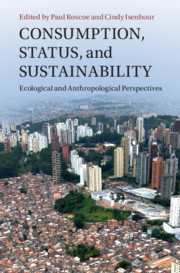Book contents
- Consumption, Status, and Sustainability
- New Directions In Sustainability And Society
- Consumption, Status, and Sustainability
- Copyright page
- Contents
- Figures
- Tables
- Contributors
- Preface
- 1 Standing Out, Fitting In, and the Consumption of the World
- Part I Status Competition and Hierarchy in Human Societies
- Part II Variability in Status Consumption
- Part III Continuity and Discontinuity
- 6 The Never-Ending Feast Redux
- 7 The Status of Archaeological Knowledge in the Study of Status
- 8 Signs of Power and the Power of Signs
- 9 Status, Consumption, and Intersectionality in Sustainability Research
- Part IV Bending the Curve
- Index
- References
7 - The Status of Archaeological Knowledge in the Study of Status
Notes on Classical Greece
from Part III - Continuity and Discontinuity
Published online by Cambridge University Press: 30 July 2021
- Consumption, Status, and Sustainability
- New Directions In Sustainability And Society
- Consumption, Status, and Sustainability
- Copyright page
- Contents
- Figures
- Tables
- Contributors
- Preface
- 1 Standing Out, Fitting In, and the Consumption of the World
- Part I Status Competition and Hierarchy in Human Societies
- Part II Variability in Status Consumption
- Part III Continuity and Discontinuity
- 6 The Never-Ending Feast Redux
- 7 The Status of Archaeological Knowledge in the Study of Status
- 8 Signs of Power and the Power of Signs
- 9 Status, Consumption, and Intersectionality in Sustainability Research
- Part IV Bending the Curve
- Index
- References
Summary
Narratives of the past inform all major decisions and solutions in the present social domain, but perceptions of history are often interpreted and represented from the perspective of those with the most social power and status. In order to understand status, consumption, or any other lived experiences in the past, academic research should therefore be wary of written sources. This chapter demonstrates the value of archaeology in evaluating deeply rooted assumptions that social status is inevitably linked to privileged consumption patterns by demonstrating how the modern notion of Western democracy and its links to status and consumption differs from its idealized Classical paragon.
Keywords
- Type
- Chapter
- Information
- Consumption, Status, and SustainabilityEcological and Anthropological Perspectives, pp. 171 - 192Publisher: Cambridge University PressPrint publication year: 2021



